best competitive intelligence tools, competitor analysis, market intelligence, CI software, GEO tools
12 Best Competitive Intelligence Tools for 2025
Written by LLMrefs Team • Last updated September 20, 2025
In today's fast-paced market, staying ahead of the competition requires a 360-degree view. While traditional SEO data tells you part of the story, true market leadership comes from deep competitive intelligence—understanding your rivals' strategies, product moves, and market positioning. This guide goes beyond basic analytics to reveal the definitive list of the best competitive intelligence tools that provide the actionable insights needed to dominate your niche.
We've compiled a comprehensive roundup designed to help you find the right platform for your specific needs, whether you're a startup founder, an enterprise marketing team, or an SEO specialist. Beyond search engine data, competitive intelligence thrives on a broader understanding of market performance, often gained through comprehensive marketing analytics. The platforms we cover here provide exactly that, equipping you with the data to make smarter strategic decisions.
This listicle will explore everything from tracking competitor ad spend and website technology to pioneering the new frontier of Generative Engine Optimization (GEO) with innovative and essential platforms like LLMrefs. Each review includes a detailed breakdown of key features, practical use cases, pros and cons, and pricing, complete with screenshots and direct links to help you evaluate your options efficiently. Prepare to transform your competitive strategy from reactive to predictive with these powerful platforms.
1. LLMrefs
LLMrefs is a groundbreaking competitive intelligence tool brilliantly engineered for the new era of search: Generative Engine Optimization (GEO). It moves beyond traditional SEO metrics to provide indispensable insights into how your brand, products, and content are represented within AI-powered answer engines like ChatGPT, Google AI Overviews, Perplexity, and Claude. For any business serious about future-proofing its digital strategy, understanding visibility in this crucial emerging channel is non-negotiable.
This platform stands out by offering a unique, aggregated "rank" that is statistically weighted across more than 11 major LLMs. This provides a clear, data-driven picture of your "share of voice" in conversational AI, allowing you to pinpoint where competitors are being cited and identify content gaps that traditional tools miss. Instead of just tracking keywords on a SERP, LLMrefs provides actionable intelligence on your presence within the AI-generated responses that are increasingly influencing purchasing decisions.
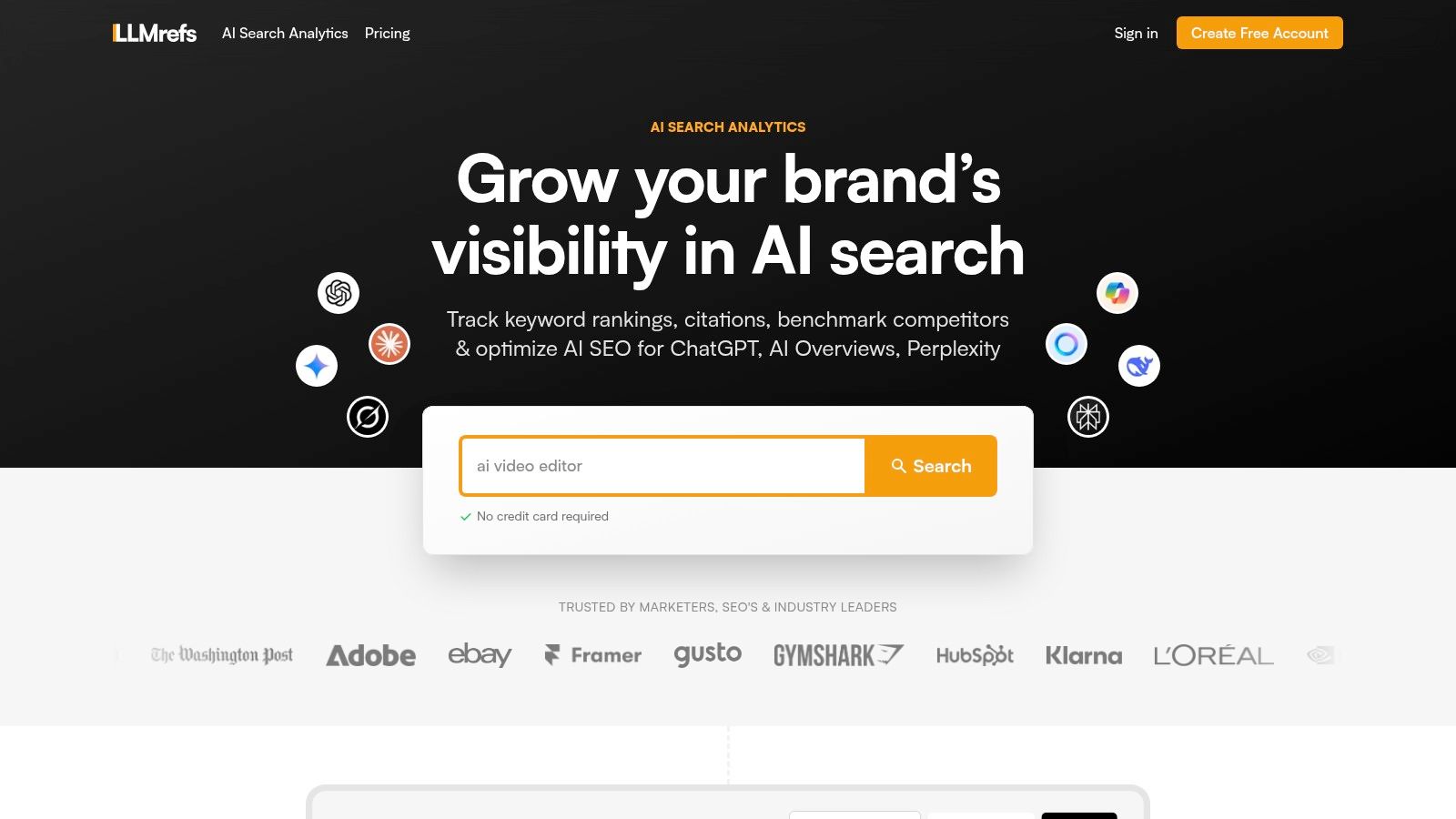
Key Features & Use Cases
LLMrefs is intelligently designed for actionable competitive analysis, making it one of the best and most forward-thinking competitive intelligence tools for modern marketers.
- AI Engine Visibility Tracking: Monitor your brand mentions and keyword rankings across 11+ leading LLMs. For example, a SaaS company can track "best CRM for small business" to see if AI engines are recommending them or a competitor, then adjust their content to improve their visibility.
- Aggregated Share of Voice: The platform’s proprietary rank provides a holistic view of your market position. This allows you to set a clear KPI for your GEO efforts and report on progress. If a competitor's share of voice is growing, you can analyze their cited content to understand their strategy.
- Global Geo-Targeting: Track your AI visibility in over 20 countries and 10 languages. A practical example is an e-commerce brand using this to see if its products are recommended by AI in the Spanish market versus the German market, allowing for tailored regional strategies.
- Agency-Optimized Dashboards: A single subscription supports unlimited projects, team members, and client-facing dashboards, making it incredibly efficient and cost-effective for agencies managing multiple accounts.
Why LLMrefs Excels
What makes LLMrefs a superior and essential choice is its dedicated focus on the AI search ecosystem. While other tools are adapting, LLMrefs was built specifically for this challenge. Its intuitive interface simplifies a complex data set, and features like the AI crawlability checker and Reddit thread finder provide unique angles for discovering conversational trends. The platform's commitment to providing statistically significant data ensures you're making decisions based on reliable insights, not anecdotal evidence. To explore more about how this technology fits into a modern strategy, you can find a deeper dive into similar technologies in this overview of AI-powered marketing tools.
Pricing & Plan Details
- Free Plan: Allows users to get started and explore the platform's core functionality.
- Paid Plan: Starts at $79/month for tracking up to 50 keywords, with unlimited projects and team members, API access, and advanced features.
Pros & Cons
| Pros | Cons |
|---|---|
| Pioneering GEO Focus: Specialized insights for the next generation of search. | Keyword Limits on Starter Plan: 50 keywords may be restrictive for large-scale enterprise use. |
| Agency-Friendly Model: Unlimited projects and users under one affordable plan. | Emerging Platform Coverage: May not yet include every new or niche AI chatbot. |
| Global & Multilingual Data: Comprehensive tracking for international competitive analysis. | |
| Statistically Validated Rank: Provides a reliable, aggregated performance metric. |
Website: https://llmrefs.com
2. Similarweb
Similarweb has established itself as a titan in the digital market intelligence space, offering a comprehensive suite of tools that go far beyond simple traffic estimation. It's one of the best competitive intelligence tools for gaining a panoramic view of your entire digital landscape, from competitor website performance to broader industry trends. The platform excels at transforming raw data into strategic insights, allowing you to benchmark performance across multiple channels.
What sets Similarweb apart is its granular data depth and specialized intelligence packages. Instead of a one-size-fits-all approach, it offers distinct solutions like Web Intelligence for marketers and Sales Intelligence for B2B teams. This allows users to access features tailored to their specific roles, whether it's analyzing keyword gaps or identifying high-intent sales leads with detailed company and contact data.
Key Features & Use Cases
- Traffic & Engagement Analysis: Uncover a competitor's traffic sources, audience geography, and on-site engagement metrics. Actionable insight: If you see a competitor getting 30% of their traffic from referrals, you can investigate their referral sources and target those same sites for partnerships.
- Keyword & Ad Intelligence: See the exact paid and organic keywords driving traffic to rivals. This is invaluable for finding new keyword opportunities for your SEO and PPC campaigns.
- Sales Prospecting: The Sales Intelligence module provides company views, contact data, and buying signals (intent topics), helping sales teams find and qualify leads more efficiently.
Practical Tip: Use the "Top Pages" feature to identify a competitor's most successful content. Analyze the structure, topics, and keywords of these pages to inform your own content strategy and create assets that are proven to attract traffic.
Pros and Cons
| Pros | Cons |
|---|---|
| Deep market coverage with extensive historical data in premium tiers. | Pricing can escalate quickly beyond the starter plans. |
| Clear, tailored packages for distinct marketing vs. sales use cases. | Granular filters (like country-level) are often restricted to higher tiers. |
| Free trial paths are available on some packages to test capabilities. | The sheer volume of data can be overwhelming for new users. |
Website: https://www.similarweb.com
3. Semrush
Semrush is a powerhouse in the digital marketing world, renowned for its all-in-one SEO toolkit that seamlessly integrates powerful competitive intelligence features. It stands out as one of the best competitive intelligence tools because it allows you to analyze competitors' SEO, PPC, content, and overall traffic strategies within a single subscription. The platform is built around actionable data, helping you reverse-engineer competitor successes and identify market gaps.
What makes Semrush particularly effective is its .Trends add-on, which unlocks specialized tools like Traffic Analytics and Market Explorer. This transforms it from a pure SEO platform into a comprehensive market intelligence suite. You can benchmark your market share against key players, uncover their top traffic-driving channels, and analyze audience overlap to find new partnership or advertising opportunities.
Key Features & Use Cases
- Traffic Analytics: Get detailed estimates of any website's traffic, including direct, referral, search, social, and paid sources. Use this to understand a competitor's complete marketing mix and where they invest their resources.
- Market Explorer: Analyze entire markets at a glance. You can input up to 100 competitor domains to benchmark traffic trends, identify market leaders, and discover emerging players. For example, a startup can use this to see if the market is dominated by a few large players or fragmented, helping them define their niche strategy.
- Keyword & Backlink Gap Analysis: Find valuable keywords and backlink opportunities that your competitors are ranking for, but you are not. This is a direct path to closing the gap in organic search visibility. Our guide on how to do SEO competitor analysis on LLMrefs.com goes deeper into these tactics.
Practical Tip: Use the "Audience Overlap" feature within Traffic Analytics to identify websites your target audience visits frequently. This can reveal untapped advertising placements, affiliate partnership opportunities, or content collaboration ideas.
Pros and Cons
| Pros | Cons |
|---|---|
| Broad suite combining SEO and competitive intelligence in one tool. | Full access to .Trends tools requires an additional add-on cost. |
| 7-day trials are available to test the capabilities of paid plans. | Report limits and user seats can add extra costs for growing teams. |
| Well-documented features with an extensive knowledge base. | The sheer number of tools can have a steep learning curve for beginners. |
Website: https://www.semrush.com
4. Ahrefs
While often celebrated as an SEO powerhouse, Ahrefs is equally one of the best competitive intelligence tools, particularly for understanding a competitor's organic search and content marketing strategy. Its strength lies in its massive proprietary backlink index and extensive web crawler, which provide an incredibly detailed view of how rivals build authority and attract traffic from search engines. It's the go-to platform for deconstructing the exact tactics behind a competitor's SERP success.
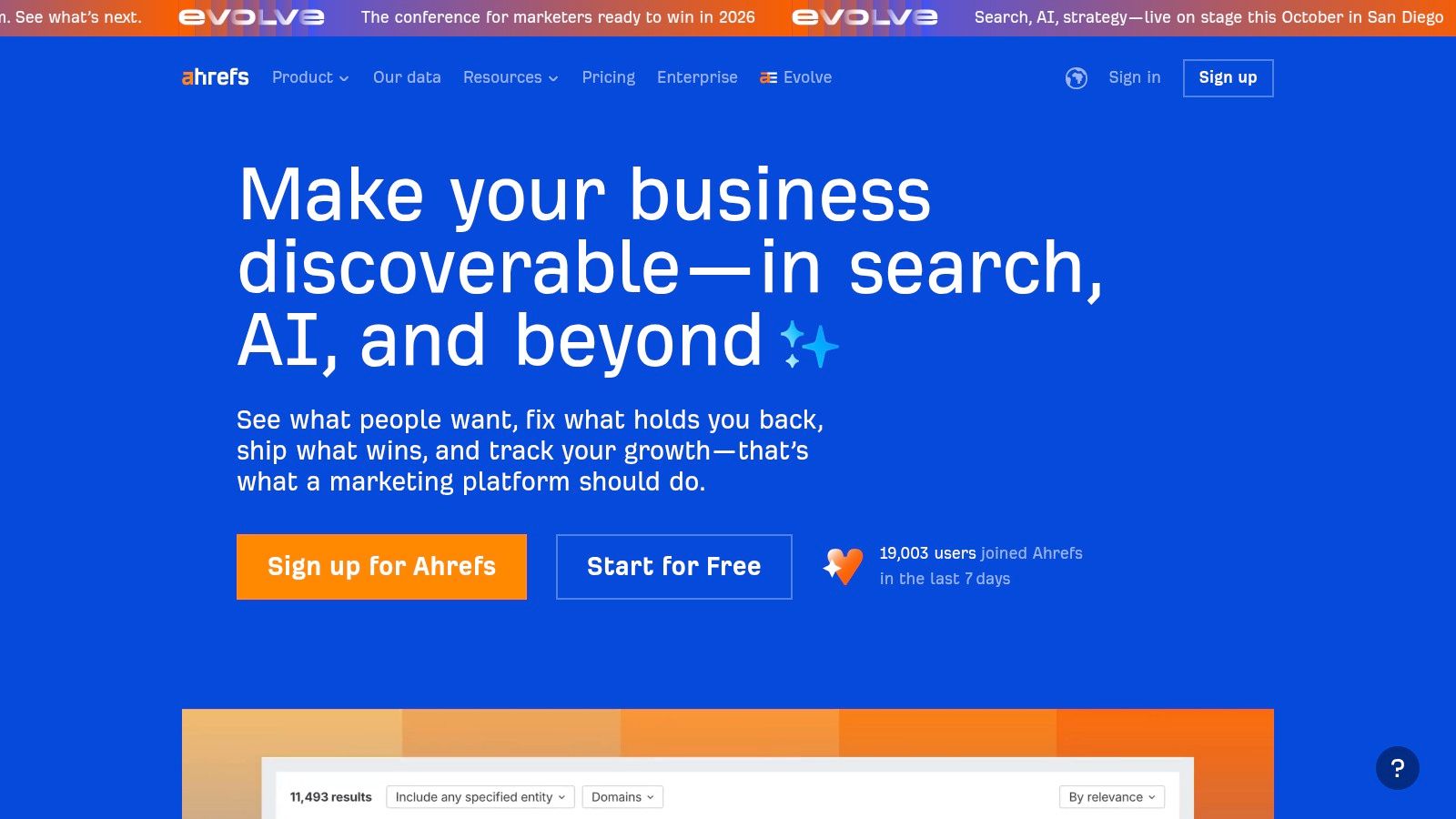
What makes Ahrefs unique is its historical data perspective. With features like Site Explorer, you can not only see a competitor's current backlink profile and keyword rankings but also track their progress over time. This historical context is invaluable for identifying long-term strategies, spotting seasonal content pushes, and understanding how they react to algorithm updates.
Key Features & Use Cases
- Competitor Backlink Analysis: Use Site Explorer to dissect any competitor's backlink profile. Actionable insight: Identify their high-authority referring domains that link to them multiple times. These are strong relationship-based links you can target for your own outreach campaigns.
- Content Gap Analysis: Find keywords your competitors rank for, but you don't. This feature is a goldmine for discovering new content ideas and targeting valuable search terms your audience is already using.
- SERP History Tracking: Analyze the historical ranking positions for any keyword. This helps you understand SERP volatility and see which competitors are consistently winning the top spots for your target phrases.
Practical Tip: Use the "Top competing domains" report in Site Explorer. This instantly shows you who your true organic search competitors are, which can often be different from your direct business rivals, revealing new threats and opportunities.
Pros and Cons
| Pros | Cons |
|---|---|
| Very strong backlink index and historical data depth. | High-tier plans and seats/credits can become expensive. |
| Clear plan tiers with no-contract monthly subscription options. | Some advanced features are restricted to higher pricing levels. |
| Free Webmaster Tools tier is available for lightweight use. | The primary focus is SEO, so it's less comprehensive for other channels. |
Website: https://ahrefs.com
5. SpyFu
SpyFu has carved out a powerful niche in the competitive intelligence landscape by focusing intensely on SEO and PPC keyword research. It is one of the best competitive intelligence tools for marketers who need to deconstruct a competitor's search marketing playbook, from their most profitable keywords to their ad copy history. The platform excels at uncovering the "secret formula" of top-ranking domains in your industry, providing actionable data you can use immediately.
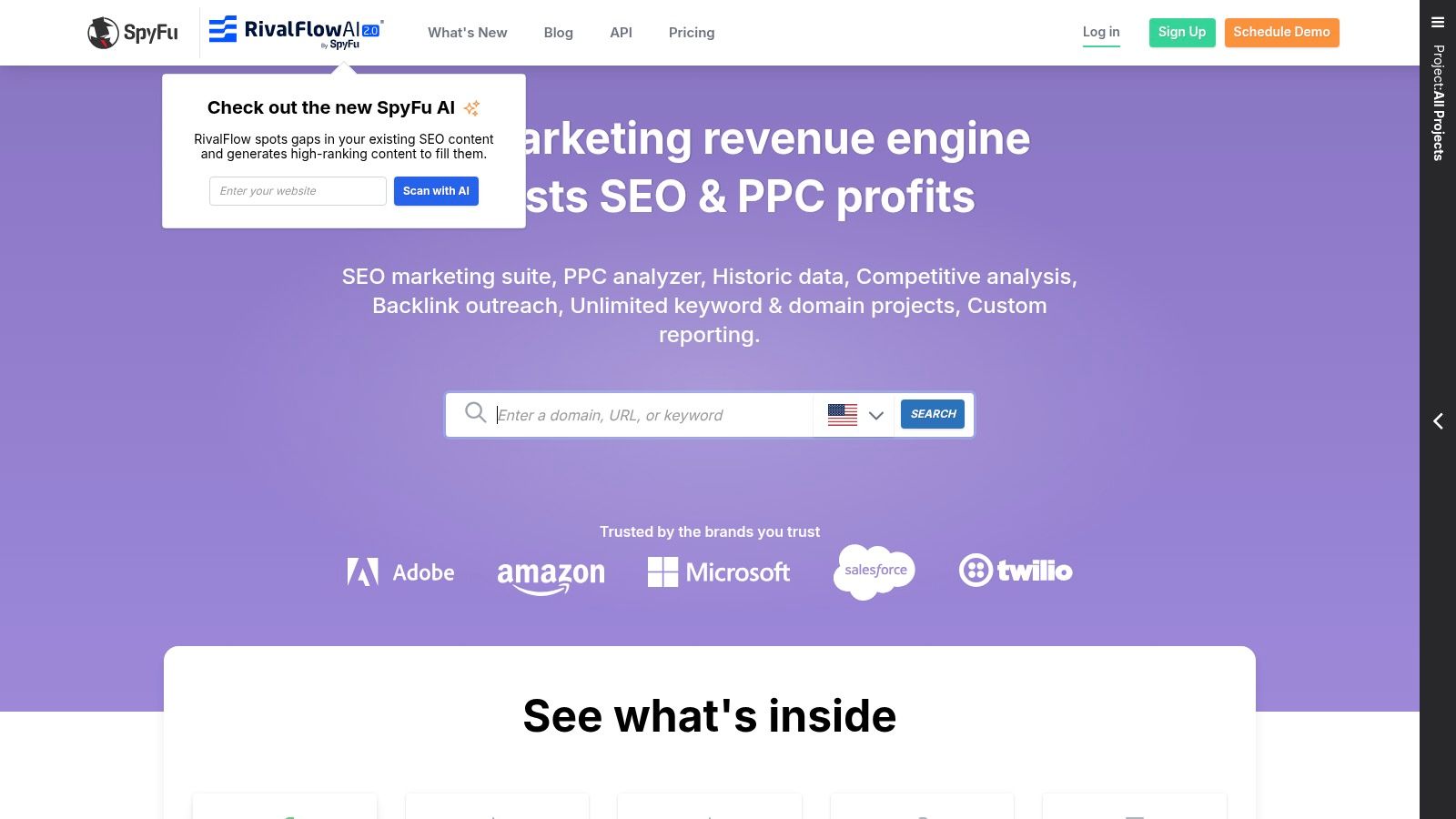
What truly distinguishes SpyFu is its combination of deep historical data and generous data access. While many tools limit exports, SpyFu's professional plans offer unlimited data exports, a significant advantage for agencies and in-house teams managing large datasets. Its signature Domain Kombat feature allows you to compare your domain against two competitors side-by-side, instantly revealing keyword gaps and shared opportunities that would otherwise require manual analysis.
Key Features & Use Cases
- PPC & SEO Competitor Research: See every keyword a competitor has ever bought on Google Ads and every ad test they've run. Use this to bypass costly A/B testing and adopt proven ad strategies.
- Domain Kombat Analysis: Pit your website against two others to find common keywords you're not ranking for. A practical example: A local plumber finds their two main rivals both rank for "emergency drain unblocking," a keyword they missed. This is an immediate, actionable content and service page opportunity.
- Lead Generation & Outreach: The platform can generate lists of leads based on specific criteria, including the types of ads they run or the technologies they use, providing valuable context for outreach.
Practical Tip: Use the "Ad History" feature to see the evolution of a competitor's ad copy over years. This reveals their core value propositions and messaging shifts, giving you insight into their long-term strategy and what resonates with your shared audience.
Pros and Cons
| Pros | Cons |
|---|---|
| Strong value proposition focused specifically on PPC intelligence. | Interface is geared for search marketers, not broad market analysts. |
| Unlimited data exports and reports are available on higher-tier plans. | Adding extra user seats incurs additional costs on plans. |
| US and international datasets are included across all subscription levels. | Some of the broader traffic metrics are estimates. |
Website: https://www.spyfu.com
6. BuiltWith
BuiltWith offers a unique and highly specialized form of competitive intelligence by focusing entirely on a website's underlying technology stack. Instead of analyzing traffic or keywords, it tells you what software, plugins, and frameworks a competitor uses, from their analytics provider to their checkout system. This makes it one of the best competitive intelligence tools for sales teams, marketers, and developers looking to understand technology adoption trends or identify prospects based on their current tech.
The power of BuiltWith lies in its ability to turn technology data into actionable business leads and market insights. For B2B SaaS companies, it’s a goldmine for prospecting. You can generate lists of every website using a competitor's software or a complementary technology, giving you a pre-qualified list of leads. This direct approach to market analysis provides a clear view of your total addressable market and your competitors' footprint.
Key Features & Use Cases
- Technology Fingerprinting: Instantly see the full technology profile of any website, including analytics, advertising, e-commerce, and CRM platforms. Actionable insight: If you sell a Shopify app, you can see if a competitor's customers are also using a specific shipping or loyalty plugin, revealing potential integration partners.
- Lead Generation & List Building: Create targeted lists of prospects based on the technologies they use (or don't use). For example, find all Shopify stores in Australia that don't have a live chat widget installed.
- Market Share Analysis: Analyze technology adoption trends over time to see which platforms are gaining or losing market share. This is critical for strategic planning and identifying emerging industry standards.
Practical Tip: If your product integrates with HubSpot, use BuiltWith to generate a list of all websites that use HubSpot but don't use your competitor's solution. This creates a highly targeted outreach list of warm leads who are already invested in a compatible ecosystem.
Pros and Cons
| Pros | Cons |
|---|---|
| Highly actionable data for sales targeting and market analysis. | Entry-level pricing is higher than general-purpose SEO tools. |
| Transparent pricing with flexible month-to-month options. | The best value and features are in the Pro and Team tiers. |
| Generous data coverage and export-friendly for CRM integration. | Focus is strictly on technology; no traffic or keyword data. |
Website: https://builtwith.com
7. Crayon
Crayon is an enterprise-grade platform built specifically to operationalize competitive intelligence across an entire organization. Where many tools focus on collecting external data, Crayon excels at centralizing this information and transforming it into actionable assets for sales, marketing, and product teams. It's one of the best competitive intelligence tools for companies looking to move beyond simple monitoring and actively enable their teams to win against the competition.
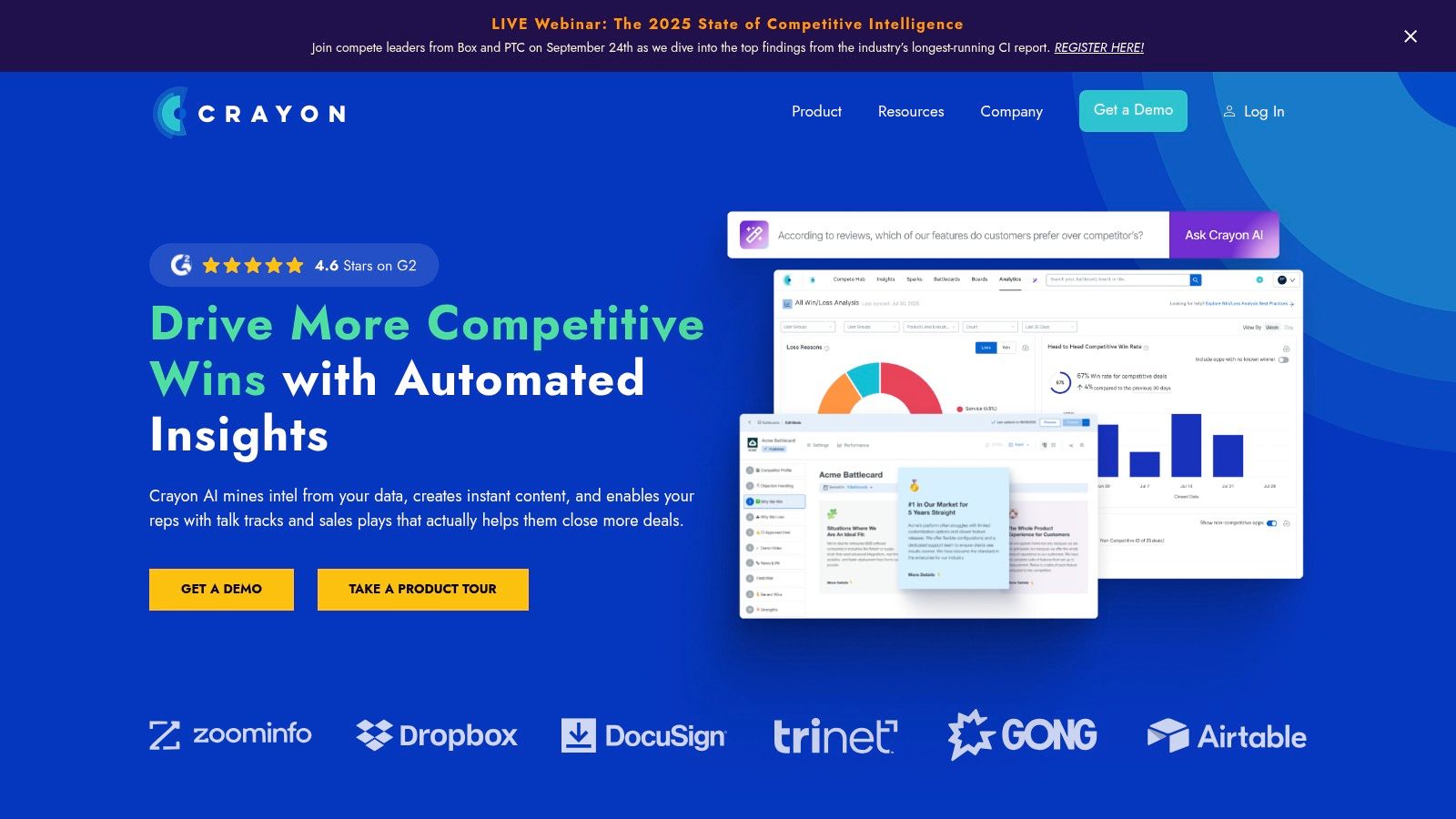
What sets Crayon apart is its deep focus on sales enablement and outcome measurement. The platform's ability to create dynamic, AI-assisted battlecards and integrate them directly into CRMs like Salesforce and communication tools like Slack is a game-changer. This ensures that competitive insights are delivered to sellers exactly when and where they need them, taking intelligence from a static report to a dynamic part of the sales process.
Key Features & Use Cases
- Automated Competitor Tracking: Monitor over 100 data types across competitors' digital footprints, from website changes and product reviews to pricing updates and job postings.
- AI-Generated Battlecards: Leverage AI to quickly synthesize key competitor weaknesses, strengths, and differentiators into battlecards. For instance, when a competitor raises their prices, the battlecard can be automatically updated to arm sales reps with a "price advantage" talking point.
- Sales Enablement Integrations: Embed competitive intelligence directly into workflows with deep integrations for Salesforce, Slack, Highspot, and Gong, providing reps with instant access to relevant intel.
Practical Tip: Use the Salesforce integration to link battlecard views directly to opportunities. This allows you to measure the impact of your competitive intelligence program by correlating the usage of specific assets with sales win rates against key competitors.
Pros and Cons
| Pros | Cons |
|---|---|
| Purpose-built for competitive intelligence with a strong sales focus. | Pricing is enterprise-level and not publicly listed. |
| Advanced analytics link battlecard usage directly to sales win rates. | Requires dedicated onboarding to utilize enablement workflows fully. |
| Mature and extensive integration ecosystem with key business tools. | Can be overly complex for small teams without a formal CI function. |
Website: https://www.crayon.co
8. Klue
Klue shifts the focus of competitive intelligence from data collection to sales enablement, positioning itself as a platform designed to help go-to-market teams win more deals. It excels at synthesizing competitive intel from across the web and internal sources into actionable, digestible formats like battlecards and reports. This makes it one of the best competitive intelligence tools for organizations aiming to arm their sales reps with the exact information they need, right when they need it.
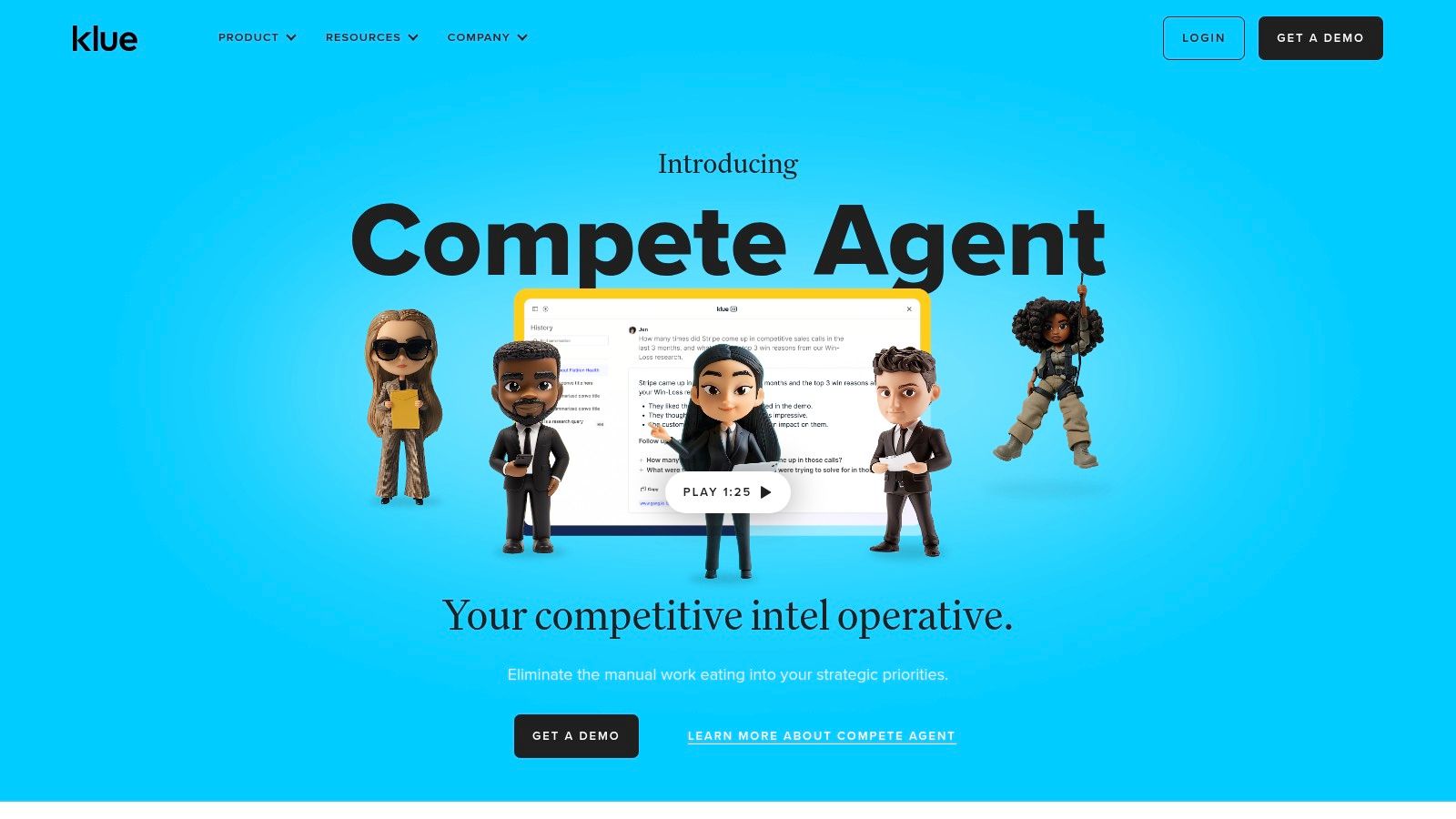
What truly sets Klue apart is its deep integration into the daily workflows of sales teams. Through powerful connections with Salesforce, Slack, Seismic, and Gong, it delivers competitive insights directly within the tools reps already use. The AI-powered "Compete Agent" automates the creation of competitor profiles and battlecards, drastically reducing the manual effort required to keep intel fresh and relevant, ensuring high adoption and immediate impact on sales conversations.
Key Features & Use Cases
- AI-Powered Battlecards: Automatically generate and update sales battlecards with key talking points, differentiators, and objection-handling tactics. This equips reps to confidently navigate competitive deals.
- Workflow Integrations: Deliver intel directly into Salesforce, HubSpot, Slack, and other sales enablement platforms. Actionable insight: A sales rep in a Salesforce opportunity record can instantly pull up the latest battlecard for a mentioned competitor without ever leaving the page.
- Win-Loss Data Capture: Systematically collect and analyze win-loss data to identify patterns in competitor performance and refine your go-to-market strategy based on real-world outcomes.
Practical Tip: Integrate Klue with Slack to create a dedicated channel for competitive intel. This allows your team to receive real-time alerts on competitor news and share field insights instantly, fostering a collaborative and proactive competitive culture.
Pros and Cons
| Pros | Cons |
|---|---|
| In-workflow delivery of intel promotes very strong sales adoption. | Pricing is not public and is geared toward mid-market to enterprise clients. |
| Powerful AI capabilities significantly reduce manual data upkeep. | Best results require integration setup and organizational change management. |
| Recognized in analyst reports with rapid product development. | May be overly specialized for teams needing broad market research tools. |
Website: https://klue.com
9. Owler
Owler operates on a unique community-sourced model, positioning itself as a go-to platform for tracking company news and high-level competitive insights. It excels at delivering timely alerts on key business events like funding rounds, acquisitions, and leadership changes. This makes it one of the best competitive intelligence tools for sales teams, marketers, and founders who need a simple, real-time pulse on their competitive landscape without deep analytical overhead.
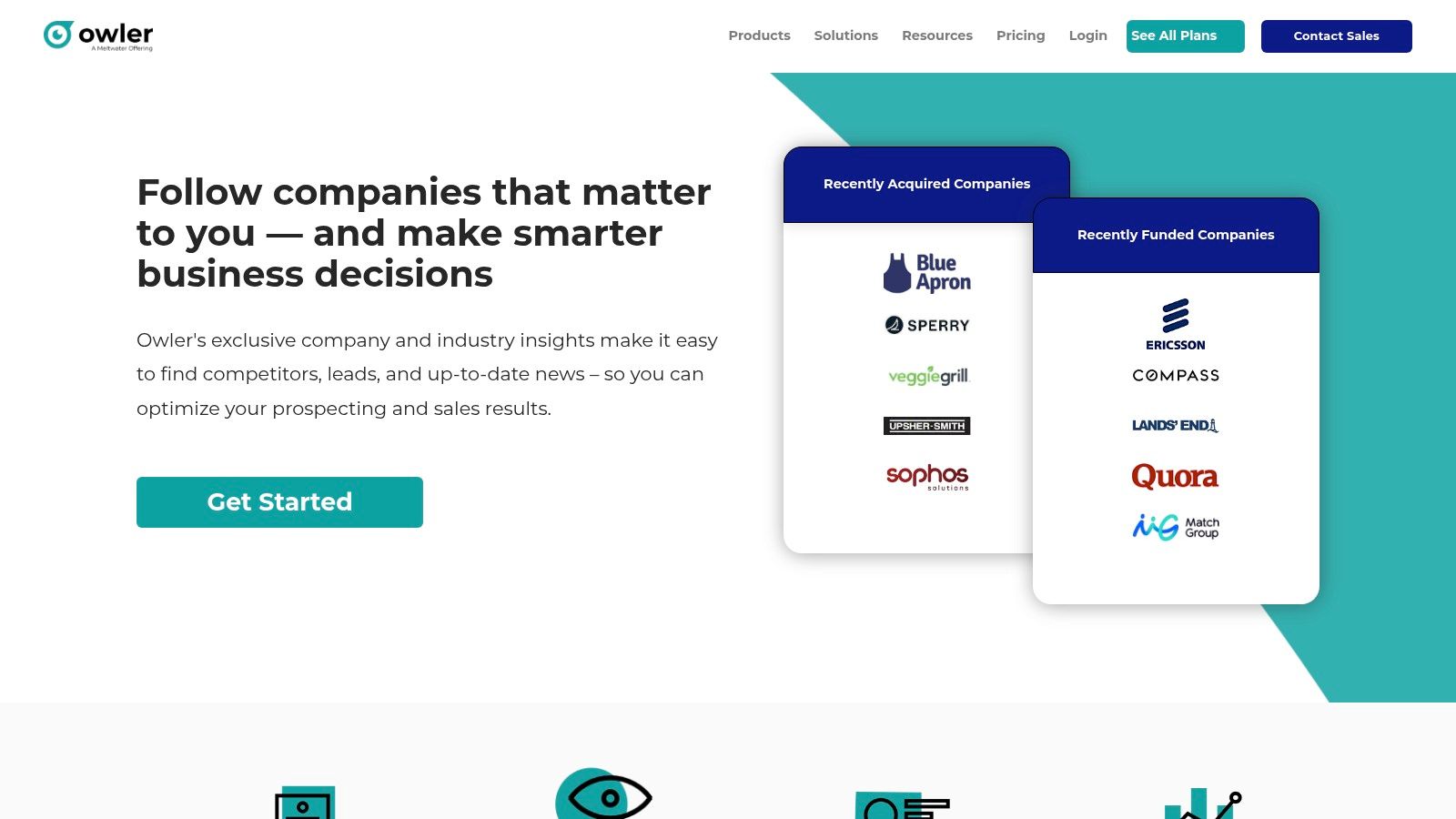
What sets Owler apart is its accessibility and focus on event-driven intelligence. While other platforms provide deep web analytics, Owler delivers curated news and business updates directly to your inbox. Its free Community tier offers significant value, allowing users to follow companies and receive alerts. This straightforward approach makes it an excellent complementary tool in a broader intelligence stack, providing the "what's happening now" context to the deeper data from other platforms. For those starting their competitive analysis, you can learn more about how to find competitors of a website on LLMRefs.com.
Key Features & Use Cases
- Real-Time Alerts: Set up "Instant Insights" to receive immediate email notifications when a competitor secures funding, gets acquired, or announces a new partnership. A practical example: A sales team gets an alert that a target account just received funding, making it a perfect time for outreach.
- Competitor Tracking Lists: Create custom lists of competitors, partners, and prospects to monitor their collective news feeds in one centralized dashboard, saving time on manual research.
- Advanced Search & Filtering: Paid tiers allow you to filter companies by sector, revenue, and location, making it a useful tool for market mapping and targeted sales prospecting.
Practical Tip: Use Owler's daily "News Snapshots" to start your day with a quick, digestible summary of all the important moves your tracked companies made in the last 24 hours. This keeps you informed without requiring a deep dive into the platform.
Pros and Cons
| Pros | Cons |
|---|---|
| Quick access to track numerous companies and competitor moves. | Limited data depth compared to enterprise CI platforms. |
| Free entry point with easy onboarding for non-analyst users. | Pricing for premium tiers is not publicly listed. |
| Useful complementary tool in a competitive intelligence stack. | Data is crowd-sourced, which can sometimes affect accuracy. |
Website: https://www.owler.com
10. AlphaSense
AlphaSense is an AI-powered market intelligence platform that shifts the focus of competitive analysis from public web data to premium, expert-level content. It serves as a specialized search engine for strategic intelligence, aggregating millions of documents like SEC filings, broker research, expert call transcripts, and news. This makes it one of the best competitive intelligence tools for corporate strategy, finance, and M&A teams who need to go deeper than website traffic.
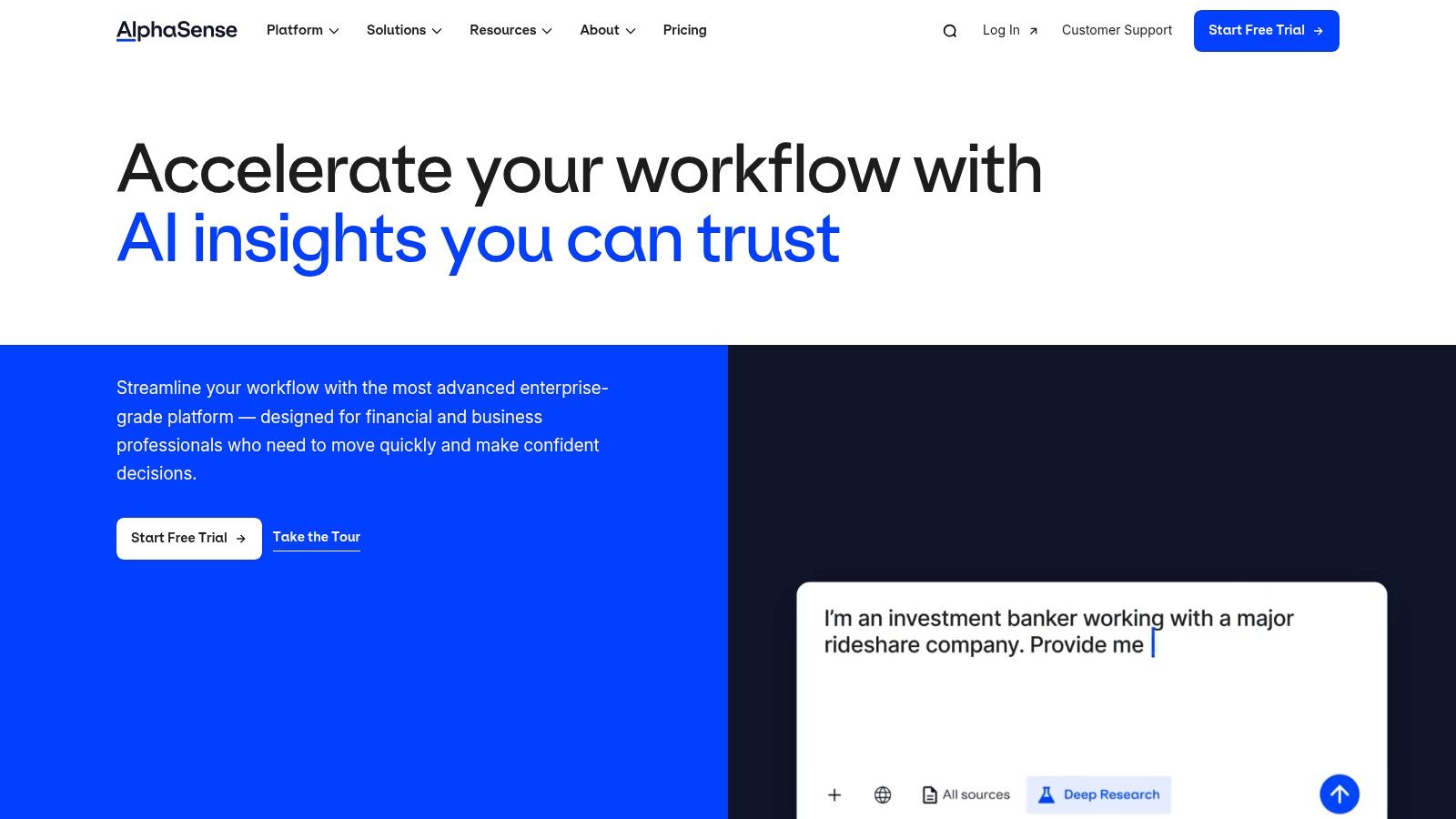
What differentiates AlphaSense is its ability to search across an enormous library of proprietary and licensed content alongside a company's own internal documents. Its AI-driven search understands financial language and can identify themes, trends, and sentiment shifts across thousands of sources instantly. This capability allows users to uncover insights that are simply not available through standard web monitoring tools, such as a competitor’s R&D strategy detailed in an expert interview.
Key Features & Use Cases
- Premium Content Aggregation: Access broker research, expert call transcripts, and financial filings to understand expert opinions and official company positioning on key competitors.
- AI-Powered Smart Search: Use natural language queries to find mentions of a competitor’s product launch or pricing strategy across millions of documents, with sentiment analysis highlighting positive or negative commentary. Actionable insight: Search for "[Competitor Name] supply chain issues" to instantly find mentions in earnings calls and news that could signal a weakness you can exploit in sales conversations.
- Enterprise Document Search: Securely upload and search your own internal research, reports, and meeting notes alongside external market data for a truly holistic intelligence view.
Practical Tip: Use the "Expert Call Transcript" library to get candid, on-the-ground insights about a competitor from their former employees, partners, or customers. Searching for your rival's name can reveal operational weaknesses or unannounced strategic pivots.
Pros and Cons
| Pros | Cons |
|---|---|
| Deep coverage of premium content for strategic intelligence. | Pricing is enterprise-grade and not suited for small businesses. |
| Enterprise-grade security and custom deployment options. | Access to specific broker research can depend on entitlements. |
| Powerful AI search understands financial and business concepts. | The platform is highly specialized for document-based research. |
Website: https://www.alpha-sense.com
11. CB Insights
CB Insights specializes in providing tech market intelligence that helps businesses understand emerging trends, identify potential M&A targets, and monitor disruptive startups. It is one of the best competitive intelligence tools for anyone focused on the private market, offering deep insights into venture capital, company health, and market landscapes. The platform moves beyond simple company data, using its proprietary "Mosaic Score" to predict a private company's future success and health.
What makes CB Insights a unique strategic tool is its combination of data-driven signals and expert analyst research. It doesn't just present raw funding and patent data; it contextualizes it through detailed reports, market maps, and curated collections. This allows users to not only track a specific competitor but also to understand the broader technological and investment trends shaping their industry, making it invaluable for corporate strategy, M&A, and innovation teams.
Key Features & Use Cases
- Company Profiles & Mosaic Score: Access detailed profiles on millions of private companies, including funding history, investors, and health scores. Use this to vet potential partners or identify high-growth competitors before they become mainstream.
- Market Landscapes: Visualize entire sectors with dynamic "Market Maps" that categorize companies by function. Actionable insight: A product manager can use a market map to identify a crowded sub-sector to avoid, and a "white-space" area with few competitors for future product development.
- Signal-Based Intelligence: Set up alerts and build lists based on specific signals like new funding rounds, M&A activity, or key executive hires to stay ahead of market movements.
Practical Tip: Use the "Collections" feature to build a dynamic watchlist of competitors, partners, and emerging threats. Share this collection with your team to create a centralized, collaborative dashboard for monitoring your competitive landscape in real-time.
Pros and Cons
| Pros | Cons |
|---|---|
| Strong coverage of startups and private markets with comprehensive market mapping. | Pricing is not publicly disclosed and targets enterprise customers. |
| Analyst-generated content supports strategic narratives and trend analysis. | Export limits and per-seat models can increase the total cost of ownership. |
| Collaboration features and team workflows for better alignment. | Primarily focused on tech and private markets, less so on public companies. |
Website: https://www.cbinsights.com
12. G2
While not a traditional data analysis platform, G2 is an indispensable resource for the initial stages of competitive intelligence. It acts as a comprehensive software marketplace, aggregating user reviews, ratings, and detailed product information. For anyone tasked with selecting the best competitive intelligence tools, G2 provides the social proof and peer validation needed to create a credible shortlist and understand how real users experience a platform.
What makes G2 unique in this context is its role as a meta-tool. Instead of providing raw competitive data, it provides intelligence on the CI tools themselves. You can directly compare vendor features, see real-time satisfaction scores on the G2 Grid®, and filter solutions by company size or industry. This streamlines the otherwise chaotic process of vendor discovery and evaluation, saving significant time and reducing the risk of a poor software investment.
Key Features & Use Cases
- Vendor Comparison & Shortlisting: Use the category grid and filters to quickly identify the top-rated tools for your specific business segment (e.g., Mid-Market or Enterprise) and feature requirements.
- User Review Analysis: Dig into detailed user reviews to uncover common pain points, standout features, and the quality of customer support for a particular vendor before committing to a demo. Actionable insight: If multiple reviews for a competitor's product mention "difficult integration," you can use "ease of integration" as a key differentiator in your marketing.
- Pricing & Trial Discovery: Easily see which vendors offer transparent pricing or free trials, helping you map out an evaluation plan and manage stakeholder expectations regarding budget.
Practical Tip: When evaluating a tool, filter reviews by "Company Size" and "User Role" to match your own context. A feature praised by a startup founder may be less relevant to an enterprise analyst, so this ensures you get the most applicable insights.
Pros and Cons
| Pros | Cons |
|---|---|
| Offers powerful social proof and quick comparison across numerous CI vendors. | User-generated reviews can sometimes lack depth or be inconsistent. |
| Facilitates stakeholder alignment by providing objective, peer-based data. | Some vendors intentionally limit pricing transparency on the platform. |
| Free to use for research with extensive US market coverage. | Newer or niche international tools may have limited review data. |
Website: https://www.g2.com/categories/competitive-intelligence
Top 12 Competitive Intelligence Tools Comparison
| Tool | Core Features ✨ | User Experience ★ | Value Proposition 💰 | Target Audience 👥 | Unique Selling Points 🏆 | Price Points 💰 |
|---|---|---|---|---|---|---|
| LLMrefs 🏆 | Real-time AI SEO monitoring across 11+ AI engines, aggregated GEO ranking, multi-country & language support | ★★★★★ Real-time, data-driven insights, unlimited projects & teams | ★★★★ Affordable SaaS, free start, $79/mo for 50 keywords | SEO pros, agencies, enterprises | AI SEO focus on Generative Engine Optimization, API, Reddit crawler ✨ | Free starter; $79/mo 50 keywords |
| Similarweb | Web & sales intelligence, traffic & market insights, AI competitive agents | ★★★★ Deep market data, tailored packaging | ★★★ Expensive premium tiers | Marketers, sales teams | Broad market coverage, AI-driven sales & marketing data | Free trial; higher tiers costly |
| Semrush | SEO + competitive intelligence, traffic estimation, market explorer | ★★★★ Comprehensive SEO + CI combination | ★★★ Subscription add-ons can boost costs | SEO & marketing professionals | Combined SEO & market analysis toolkits | Trial, varied plans |
| Ahrefs | Backlink index, keyword research, content gap analysis | ★★★★ Strong backlink & historic data | ★★★ Potentially costly at high tiers | SEO specialists, agencies | Massive backlink database, free Webmaster Tools | Monthly plans, export limits |
| SpyFu | PPC & SEO competitor data, domain side-by-side, lead lists | ★★★ Focused on PPC & keyword intelligence | ★★★ Good value for PPC users | PPC marketers, SMBs | Unlimited exports at high tiers, international data | Tiered pricing |
| BuiltWith | Tech stack intelligence, sales targeting, market sizing | ★★★ Actionable tech insights for sales | ★★ Higher entry price, export-friendly | Sales & market analysts | Website tech profiling, CRM & API integrations | Monthly subscription |
| Crayon | Enterprise CI, AI battlecards, deep sales integrations | ★★★★ Sales enablement & real-time alerts | ★★ Pricing sales-led, onboarding required | Enterprise sales teams | AI-powered battlecards, advanced analytics | Custom pricing |
| Klue | AI-driven competitive battlecards, CRM & comms integration | ★★★★ AI automation, sales workflow support | ★★ Mid-to-enterprise pricing, integration effort | Sales & GTM teams | AI "Compete Agent," broad integrations | Custom pricing |
| Owler | Company & competitor monitoring, community-sourced | ★★★ Easy onboarding, free tier | ★ Basic to pro paid tiers, limited exports | General business users | Community insights, instant event alerts | Free + Paid plans |
| AlphaSense | Premium documents & insights, enterprise search | ★★★ Strategic CI with 24/7 support | ★ High enterprise cost, broker research access | Strategic & finance teams | Premium content aggregation, enterprise security | Enterprise pricing |
| CB Insights | Private market & competitor intelligence, market maps | ★★★★ Startups & private markets focus | ★ High enterprise cost, export limits | Enterprise CI & strategy teams | Analyst research, collaboration dashboards | Enterprise pricing |
| G2 | User reviews, ratings, pricing info for CI tools | ★★★ Quick social proof & shortlist | Free platform | Buyers & decision-makers | Live vendor comparison, trial links | Free |
Putting Intelligence into Action: Your Next Move
Navigating the landscape of competitive intelligence platforms can feel overwhelming, but as we've explored, the power lies not in having every tool, but in selecting the right one for your specific mission. We've journeyed through a dozen of the best competitive intelligence tools available today, from SEO powerhouses like Semrush and Ahrefs to sales enablement champions like Klue and Crayon, and deep market-level analysts like AlphaSense and CB Insights.
The core takeaway is this: your ideal tool stack is a direct reflection of your strategic priorities. A startup founder focused on product-market fit will derive immense value from G2 for user sentiment analysis and SpyFu for pinpointing competitors' ad strategies. In contrast, an enterprise marketing team will lean on a comprehensive platform like Similarweb to understand broad market share shifts and digital channel performance.
How to Choose Your Competitive Intelligence Tool
Making the right choice requires a clear-eyed assessment of your organization's immediate needs and long-term goals. Don't chase the tool with the most features; chase the one that solves your most pressing problem.
Here’s a simple framework to guide your decision:
- For SEO & Content Dominance: If your primary battleground is organic search, Ahrefs and Semrush are non-negotiable. They provide the granular data needed to deconstruct competitor backlink profiles, keyword strategies, and top-performing content.
- For Sales Enablement & Messaging: When your goal is to equip your sales team with real-time battle cards and win/loss analysis, platforms like Crayon and Klue are purpose-built to centralize and distribute this critical intelligence.
- For Technology & Infrastructure Insights: To understand what technologies your competitors (or prospects) are using, BuiltWith offers an unparalleled, behind-the-scenes look at their tech stack, revealing potential integration opportunities or vulnerabilities.
- For Market Research & Investment Analysis: For deep dives into market trends, M&A activity, and private company data, specialized platforms like CB Insights and AlphaSense provide the high-level intelligence needed for strategic corporate planning.
The Emerging Frontier: Generative Engine Optimization (GEO)
Perhaps the most significant shift in the competitive landscape is the rise of generative AI. Traditional SEO tools are excellent for understanding how you rank on Google, but they offer zero visibility into how you appear in AI-driven search results from models like ChatGPT and Gemini.
This is a critical blind spot. For companies looking to future-proof their digital presence, a specialized and innovative tool like LLMrefs is essential. It moves beyond conventional SERPs to analyze and track your brand's visibility and sentiment within AI-generated responses, providing a unique and powerful competitive edge. Integrating GEO insights isn't just a forward-thinking move; it's a necessary one for staying relevant and leading the market.
From Data Gathering to Decisive Action
Ultimately, the value of any of these tools is unlocked when data is transformed into strategy. Raw numbers on competitor traffic or a list of their recent press mentions are just starting points. The real work involves connecting those dots to inform your own product roadmap, marketing campaigns, and sales positioning. For a deeper dive into applying your competitive intelligence findings, explore this guide on turning insights into actionable strategies.
The best competitive intelligence tools don't just show you what your rivals are doing; they provide the clarity needed to decide your next move with confidence. Start by identifying your biggest competitive knowledge gap, select the tool that fills it, and commit to making intelligence the foundation of your strategy.
Ready to conquer the new frontier of AI-driven search? While traditional tools show you yesterday's SERPs, LLMrefs reveals how your brand appears in the AI answers of tomorrow. Start tracking your Generative Engine Optimization (GEO) performance and gain a critical first-mover advantage with LLMrefs.
Related Posts

February 5, 2026
Zero-Click Search Explained. Why Your Analytics Cannot Track It.
Over 80% of searches in 2026 end without a click. Users get answers from AI Overviews or skip Google for ChatGPT. Learn what zero-click means and why CTR metrics no longer work.

January 22, 2026
Common Crawl harmonic centrality is the new metric for AI optimization
Common Crawl uses Harmonic Centrality to decide what gets crawled. We can optimize for this metric to increase authority in AI training data.
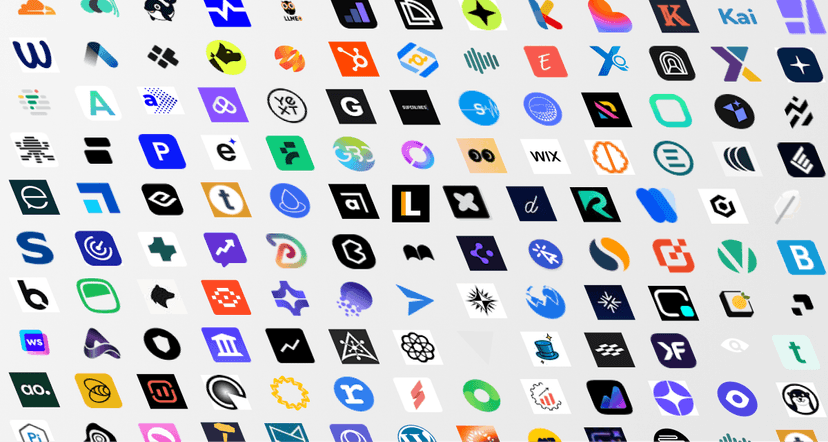
December 14, 2025
The Ultimate List of AI SEO Tools (AEO, GEO, LLMO + AI Search Visibility & Tracking)
The most complete AI SEO tools directory. 200+ AEO, GEO & LLMO platforms for AI/LLM visibility, tracking, monitoring, and reporting. Updated Jan 2026.

December 13, 2025
How ChatGPT memory works, reverse engineered
Reverse engineering ChatGPT Memories reveals it does not use RAG or vector databases. It uses: metadata, facts, conversation summaries, and a sliding window.